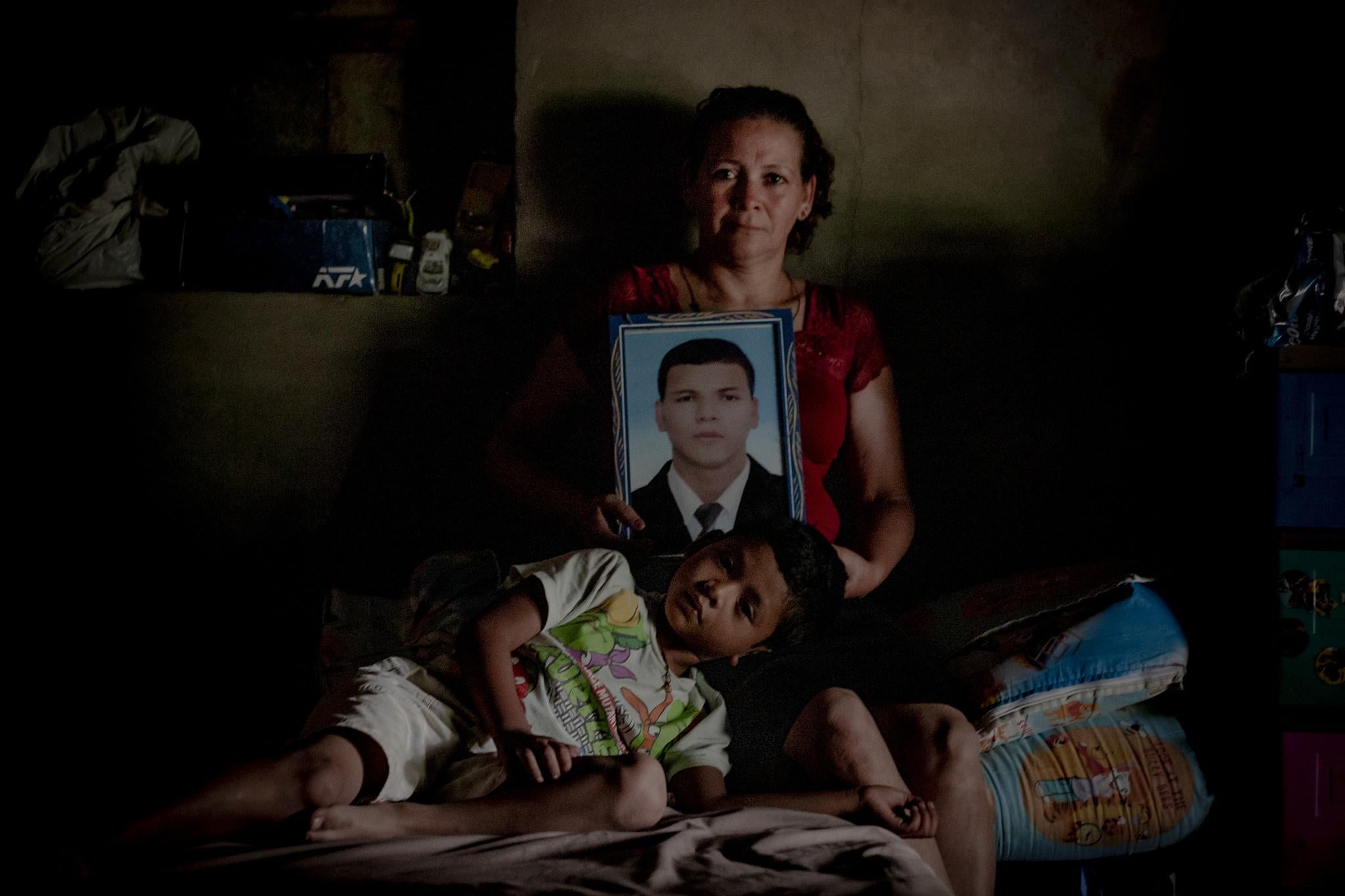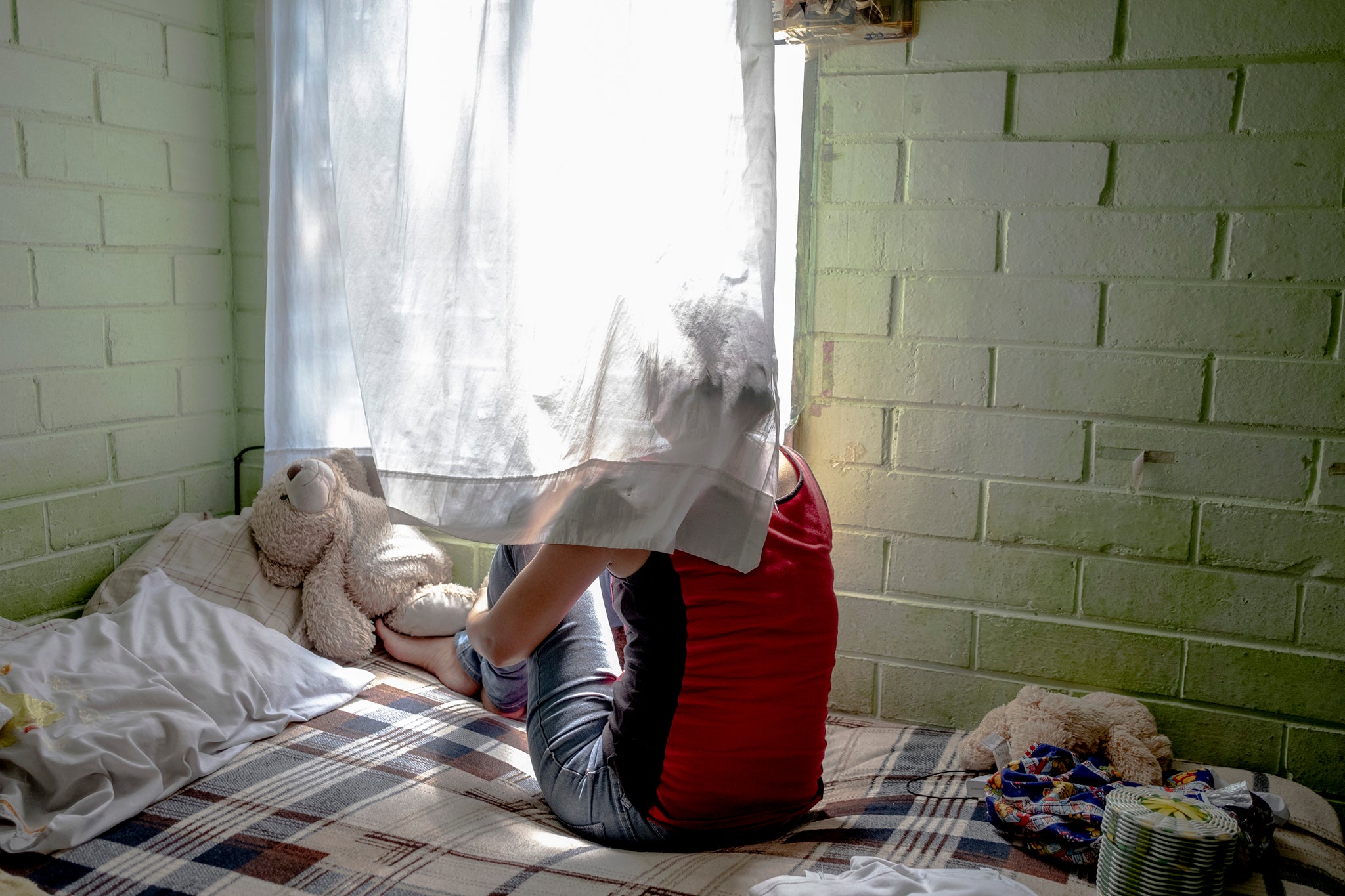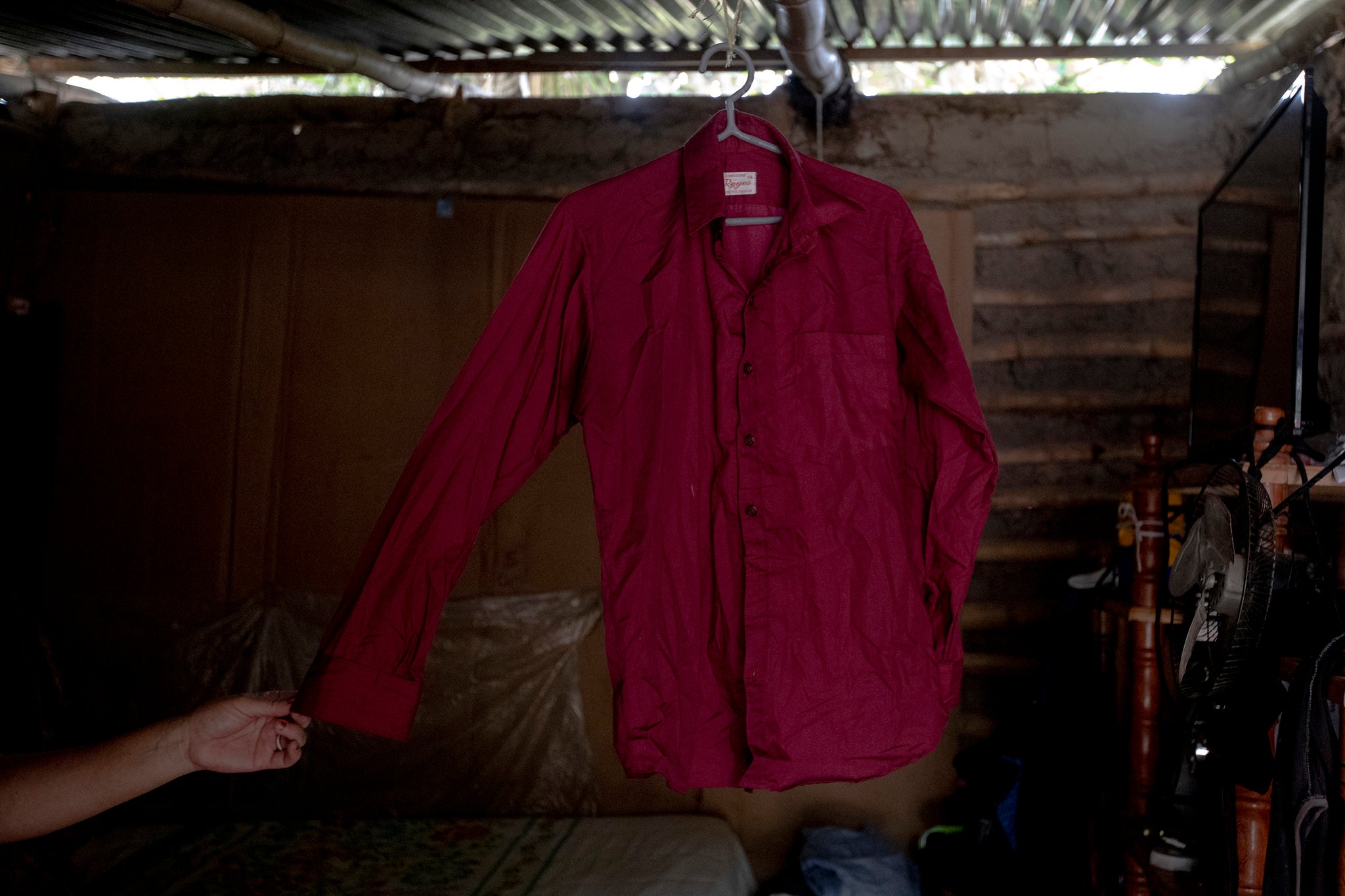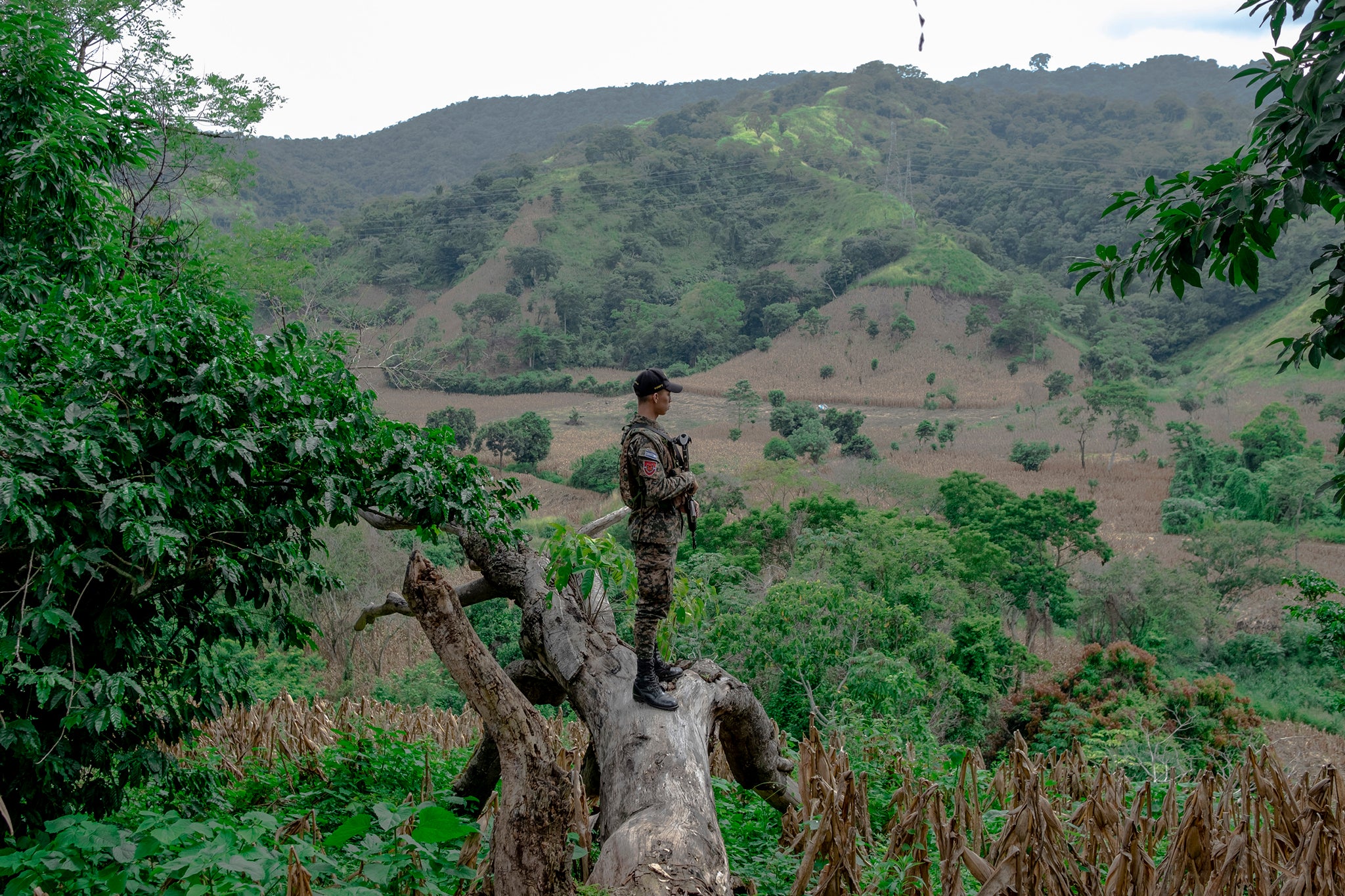'I'm going to find him, even if he's not alive': Unexplained disappearances in El Salvador revive painful Cold War memories
Three decades after a brutal civil war characterised by never-explained, never-resolved disappearances, Salvadorans are again vanishing

For Daisy Flores, Day 135 began like so many others. She soaked corn in a bucket on the dirt floor for tortillas. She washed the kids' clothes in a blue plastic bin. And she thought, again, about that afternoon in May when her 18-year-old son Edwin rode off on his brother's motorcycle.
He still hasn't come home.
Twenty miles away, in a working-class neighbourhood in San Salvador, Karen was plodding through Day 297. She coped by writing notes to her absent husband and taping them to the bedroom wall.
“I send you a little kiss,” she'd scrawled to the man who had disappeared last year while delivering electricity bills. And: “I can't take it anymore.”
Not far from her, a third family endured another Monday without their loved one. The middle-aged man had gone missing on his way home from his plumbing job. Was it already Day 192? They'd searched everywhere. Nothing.
Three decades after a brutal civil war characterised by never-explained, never-resolved disappearances, Salvadorans are again vanishing.
The phenomenon is resurrecting one of the most chilling elements of Cold War Latin America. Back in the 1970s and '80s, tens of thousands of people disappeared as right-wing governments - many supported by the United States - fought to extinguish leftist insurgencies.
These days, countries such as Mexico, Brazil and El Salvador are battered by criminal wars. The governments aren't fighting Marxist guerrillas, but gangs and drug cartels instead.
In Mexico, more than 3,000 clandestine grave sites have been unearthed as families search for the 40,000 missing. In El Salvador, few of the burial sites have been found.
Which is why, when the government discovered one outside the capital last month, TV reporters rushed to the scene - and dozens of families began to wonder if their mystery would finally end.
“I know he's here,” said the mother of a 14-year-old.
“I am always hoping,” Karen said.
“They haven't told me anything,” Ms Flores said.
But for one family, things were about to change.

No one knows exactly how many people in El Salvador have gone missing. National police say at least 2,457 people were reported disappeared in 2018, the most in a dozen years. The attorney general's office puts the figure at 3,437 - more than the total of homicides. Both numbers are widely seen as undercounts.
For Ms Flores, her son's disappearance was a new version of an old nightmare. Her two uncles were among the at least 8,000 people who vanished during El Salvador's 12-year civil war.
That was another era - of death squads, the Reagan Doctrine against communism, guerrillas wielding red banners and AK-47s. El Salvador today is a democracy, with free elections and onetime Marxists in congress.
So why are disappearances back?
One reason is they make it easier for killers to avoid investigation. That goes both for gang members killing their rivals and for cops secretly executing suspects.
“If there is no body, there's no evidence,” said Marvin Reyes, who spent 20 years in the national police.
But the disappearances also reflect a political strategy. That became evident when El Salvador's top two gangs reached a government-backed truce in 2012. The homicide rate - among the highest in the hemisphere - plunged. But disappearances rose.
“If violence needed to be carried out [by gangs], it needed to be invisible, to avoid attention from state authorities,” said Angelica Duran Martínez, who studies Latin American violence at the University of Massachusetts at Lowell.
Analysts suspect the gangs and the government hide corpses to keep the homicide rate down.
“This is a phenomenon that, in past years, was hidden. They didn't want it to be visible, but we're all seeing it ”
For victims' families, the uncertainty is cruel: There's no resolution, no body to bury, no hope of closure. “We have so much stress,” said Karen, a 39-year-old mother of three.
She and her kids try to keep their minds on work and school, but their bodies betray them: Karen's insomnia, her son's overeating, her daughter's wildly oscillating periods.
She believes her husband was abducted because he refused to hide a gang's weapons in the family's home. She is so frightened of retaliation that she spoke on the condition that her last name not be used.
Daisy Flores, 47, also suspects her son was hauled away by gang members.
Edwin was perhaps the most affectionate of her seven kids. The kind of boy who would sneak up behind her at the stove and grab her in a bear hug. Who wasn't embarrassed to accompany his mama to the market.
She doesn't think he was a gang member. But: “I can't tell you what kind of friends he had.” Everyone knew that MS-13 dominated their hamlet, a woodsy patch of small, concrete homes surrounded by fields where campesinos grew corn and raised cows and chickens. Nearby villages were ruled by the rival gang Barrio 18.
Edwin's absence is a constant torment. One of his brothers was so terrified that he considered migrating to the United States, like tens of thousands of Salvadorans in recent years.
Whenever Daisy thought of her missing son, she'd lose her appetite.
“I can't live like this, learning nothing,” she said.
But in recent months, there was a new reason for hope.
Nayib Bukele, the charismatic young mayor of San Salvador, was elected president in February on promises of change.
“They say the president, now, he's helping people,” Daisy said. “And that if you go to the attorney general, he's helping to find the disappeared.”

Attorney General Raul Melara hopped out of an SUV and strode toward the yellow police tape.
“Is it up here?” he asked.
At 47, Mr Melara was part of El Salvador's tiny business elite, with a doctorate in law and years of leading the National Association of Private Enterprise. He had swept-back dark hair and wire-framed glasses and favoured starched white shirts. But on this afternoon, he had donned jeans, a grey polo shirt and a windbreaker to visit the village outside San Salvador known as El Limon - notorious territory of Barrio 18.
Mr Melara scrambled up a nearly vertical dirt path alongside a dying cornfield, trampling vines and brushing through shoulder-high grass. A quarter-mile up lay a clearing, with mounds of freshly dug dirt and a body.
It had been a man in jeans and work boots.
More bodies would probably be dug up in the coming weeks, Mr Melara told journalists. The new government, he said, was committed to finding the disappeared and punishing the culprits.
“This is a phenomenon that, in past years, was hidden. They didn't want it to be visible,” he told the TV cameras. “But we're all seeing it.”
In just a few months, Mr Melara had made some aggressive moves. He'd formed a team of prosecutors to focus on the disappeared. He'd promoted tougher penalties for those involved in the crime. He was working with the police to produce more accurate numbers.
Some were skeptical. It wasn't until 2017 - a quarter-century after the civil war's end - that the government finally created a commission to search for the disappeared from that conflict. And locating the more recent victims could be politically unpalatable in a country obsessed with the murder rate.
“Finding and identifying these bodies will inevitably imply a rise in the homicide index,” said Celia Medrano of the human-rights group Cristosal.
Arnau Baulenas, legal coordinator of the Human Rights Institute at the Jose Simeon Canas University of Central America, said Mr Melara's initiatives were positive but insufficient.
“The attorney general has a very small team,” he noted. There are so few forensic criminologists that one of them - Israel Ticas - has become a celebrity for helping mothers find the remains of their children.
Mr Melara knows he lacks money, equipment and expertise. It sometimes seems the only thing that's not in short supply is fear.
“In Mexico, the families of the victims are visible,” he told The Washington Post. “They've generated social pressure.”
El Salvador is different. Indeed, at El Limon, as the investigators shovelled dirt, a mother in blue flip-flops approached. Her son vanished a year ago, at age 14.
“I'm going to find him,” she said, weeping, in a TV interview. “Even if he's not alive, and it's just to bury him.”
But she begged the cameraman not to identify her. He filmed her feet.
There was no sign of her son. On Day 2 of the dig, though, investigators discovered a tantalising clue near the body.
It was a wallet. Inside was an ID card.

The call came that day. It had been six months since the middle-aged plumbing worker vanished. Now his family was being summoned to the Justice Ministry.
Maybe, at last, they'd have an answer. But they couldn't even grieve in peace. They begged reporters not to release his identity.
“We don't want to make a lot of noise,” said one of the man's relatives. “The neighbourhood is really dangerous.”
Another relative was more blunt: “Saying the wrong thing could get you killed.”
The legacy of fear in El Salvador is profound. Three decades after the war, there are people who are only now revealing the disappearance of a relative in that conflict. Back then the scourge was death squads. Now it's gangs and rogue police.
“There's silence - exactly like during the armed conflict,” said Eduardo Garcia, who heads Pro-Busqueda, a group searching for war victims.
Ten days after the discovery at El Limon, investigators still were trying to match the corpse with the DNA submitted by the plumbing worker's relatives.
The families waited.
For Karen, the news had generated a brief flicker of possibility. Then authorities told her the corpse wasn't her husband. “I am not going to stop calling the attorney general's office,” she said. Maybe they'd discover some sign of him, somewhere.
Daisy hasn't given up, either. In her son's bedroom, she unlatched a suitcase stuffed with neatly folded shirts and slacks.
“Here are his clothes,” she said. “I'm keeping them here so they don't get all dusty.”
She has vivid dreams of her son. In one, he was trapped in a room. “I couldn't get him out,” she said. One day she heard her 3-year-old grandson shouting outside the house. “Edwin is coming,” he yelled, pointing at the dirt path. No one was there.
By Day 145, Daisy was thinking of paying another visit to the attorney general's office.
“God willing, they'll have some news soon.”
The Washington Post
Join our commenting forum
Join thought-provoking conversations, follow other Independent readers and see their replies
Comments
Bookmark popover
Removed from bookmarks